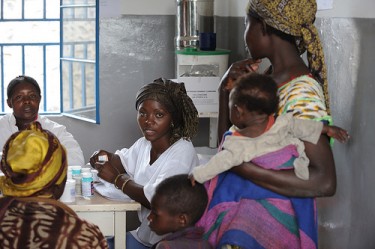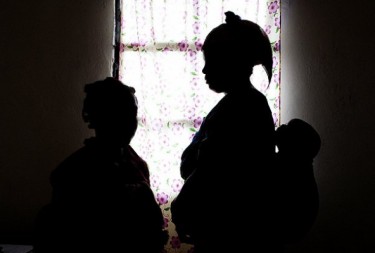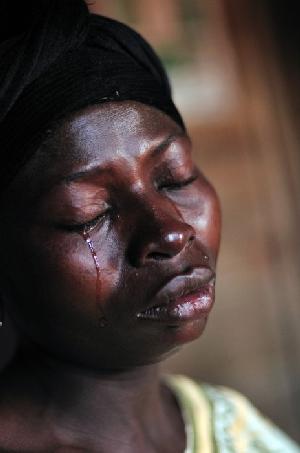[Testimonies for this post were collected by email or face-to-face interviews in French and all links forward to French articles]
Illegal abortion is a common practice in several provinces of the Democratic Republic of Congo, particularly in Goma, Nord-Kivu, where the number of deaths recorded as caused by these back-door procedures is increasing day by day at a worrisome rate. Several foetuses have been found in recent weeks in parts of Goma, located in the east of the D.R.C., alarming many in the community.
Local administrator Mapendo Victorine said in an email she is very concerned about this “criminal” act:
Il y a une semaine dans le quartier Mikeno à Birere un de plus grands quartiers de la ville de Goma un fœtus de 5 mois a été retrouvé emballé dans un sachet dans une poubelle publique. La mère ou jeune fille responsable de cet acte est inconnue.
Congolese law prohibits abortion in all parts of the country, and as such severe punishments are sanctioned to all those involved in the elicitation of illegal abortions. Lawyer Alain Lushule, a member of the bar in Goma, explained to us that Articles 165 and 166 of the Congolese Penal Code (Book II) mandate a punishment of 5 to 10 years’ imprisonment for having an abortion, and 5 to 15 years for participation in the act.
Photojournalist Alain Wandiwoji expressed his concerns on his blog over the distressing situation in Goma:
Depuis décembre dernier, 11 fœtus ont été ramassés dans des caniveaux, et trois bébés étranglés retrouvés dans des poubelles publiques de certains quartiers de Goma : “Trop c'est trop ! Laisse entendre un pasteur de la ville de Goma.
A mother, indignant after seeing the foetus, told us in a face-to-face interview:
La personne qui a commis cet acte doit être recherchée par la police et être punit sévèrement pour ce meurtre. Des enfants ont été les premiers à découvrir cet enfant alors qu’ils pensaient trouver un ballon. Entendant cette foule nombreuse du quartier autour de ce fœtus, il y a une forte tristesse mais personne ne veut comprendre et s’interroger sur le pourquoi de ces pratiques d’avortement qui prennent de plus en plus de l’ampleur. Tout le monde condamne cet acte.
Fortuna Lufungula, a human rights activist in Goma, in an email touched on the cultural and moral reasons behind many in the community's denunciation of abortion:
Les traditions africaines et congolaises sont fondées sur des principes selon lesquelles avorter est un meurtre. Nul n’est censé tué et personne n’est autorisé de mettre fin à une vie d’un fœtus même quand celui-ci est d’un jour. Si on l’élimine, c’est un meurtre et il doit être sanctionné.
Can it be said that abortion is a crime without identifying the causes, issues and consequences of an act that is carried out by many young women and even some married women in Goma? What are the main reasons that lead these women to have abortions?
Parents’ inflexibility
Many parents in Goma still find it difficult to accept their daughters falling pregnant, even if they are not minors. When parents discover that their daughter is pregnant, she is many times immediately removed from the family home and taken to the man responsible for the pregnancy, forced into starting her own family.
Mwamini Bujiriri, the mother of a family from Goma, drove her 14-year-old daughter from their family home after discovering she was pregnant by a young man from the same village. Bujiriri explained in an interview:
Je ne peux pas rester avec ma fille lorsqu’elle est enceinte car elle m’a ridiculisé elle doit aller rejoindre son mari responsable de sa grossesse. Nous ne pouvons pas rester deux femmes dans la même maison c’est impossible.
Many parents do not want to hear the word “abortion” because, according to many of them, abortion is murder.
The irresponsibility of young men
Irresponsibility of the young men involved, often alongside religious beliefs, force many young women into underground abortions and even infanticide.
A young girl, who does not want to be identified, gave us her account:
Lorsque je suis tombée enceinte, je n’ai pas eu le courage d’en parler à mes parents car ils devraient seulement me chasser de la maison et ou me tuer. J’ai décidé de me taire. En même temps, le garçon responsable de ma grossesse ne voulait pas croire que c'était lui le vrai responsable. Je me suis alors retrouvé entre deux mondes car je ne pouvais rien dire à mes parents et en même temps je n’avais nulle part où aller. C’est ainsi que j’ai décidé d’avorter, mais en même temps aussi je ne pouvais pas aller à l’hôpital car l’avortement n’est pas autorisé dans notre pays et donc les médecins ne pouvaient pas accepter de le faire. Je suis donc partie voir un médecin qui a fait la procédure dans la clandestinité loin de mon quartier.
There are a lot of other young girls who, like her, are forced into illegal abortions that are carried out in secret and bring with them many associated risks, including death.
Many cases are recorded by the CONDE medical clinic in the Karisimbi neighborhood in Goma. A doctor from the clinic, who wishes to remain anonymous, told us:
Au mois de Mars dernier, une jeune fille d’une vingtaine d’année est morte de suite d’un avortement qu’elle a provoqué elle est arrivé à l’hôpital dans un très mauvais état elle a provoqué la grossesse. On a tous fait pour l’aider mais elle a fini par mourir. Beaucoup des jeunes filles meurent simplement parce qu’elles ont tenté d’avorter clandestinement.
Beliefs and abortion
Many girls who are raped, sometimes by armed men, do not have abortions for fear of committing a sin against God. These girls suffer in silence, both with their unwanted pregnancies and the difficulty of upholding their religious beliefs.
A victim of sexual violence told us about her ordeal in the Lydia Centre, where she is receiving support. The centre, which oversees victims of sexual violence, was created by the ASLPC, Action Sociale pour la Promotion des Laissés pour Compte (social action association to help those left behind) in Goma. She explains:
Quand j’ai été violée, c’était insupportable à vivre et très douloureux pour moi. Malheureusement quelques mois après je me suis retrouvé enceinte. Je n'ai pas su quoi faire, je ne voulais même pas car c’est un péché. Mais comme je ne peux pas avorter, je garde quand même mon bébé. Même si quand je le vois je me rappelle de beaucoup des choses douloureuses.
The situation according to medical specialists
A gynaecologist from the Provincial Hospital of Goma gave his point of view:
La jeune fille devrait pouvoir avoir le droit, dans le cas où elle se sent pas prête moralement et physiquement d’avoir un enfant de choisir d'avorter.
Given the degree of the situation, it seems that the Congolese government should consider an alternative to the current law, the gynecologist explained:
Les victimes sont encore trop souvent sujets à recourir aux avortements dans la clandestinité qui comporte beaucoup des risques. Que le gouvernement autorise officiellement l’avortement afin que tous ces actes cessent et que si on veut avorter, qu’on le fasse sans aucune crainte dans des hôpitaux qui peuvent assurer une bonne prise en charge médicale. Il faut aussi renforcer la sensibilisation des femmes et des jeunes filles sur l’utilisation des méthodes contraceptives, afin d’éviter les grossesses indésirables.










1 comment